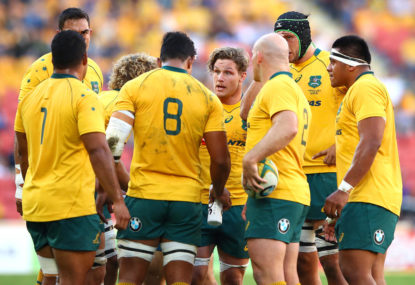Can the Wallabies beat the All Blacks on Saturday night? It’s possible. It’s highly unlikely, but it’s possible.
What the Wallabies will need is for all the key areas to go right for them – and probably for the All Blacks to have an off night themselves.
So what are those keys to slowing the All Blacks and staying in the game? I’ve come up with my top five below. Get these right, and the Wallabies will give themselves the best opportunity to pull off the upset so few believe is possible.
Defensive organisation
The Wallabies will no doubt have taken note of how the British and Irish Lions contained the All Blacks defensively.
The Lions used defence as a form of attack – ferocious line speed combined with physical upper-body contact. It won’t be easy for the Wallabies to replicate the same level of intensity the Lions displayed, and the All Blacks will also be anticipating the threat, so the men in gold will need to be incredibly disciplined.
Rather than a flat line, expect the Wallabies to defend using ‘shooters’ – nominated ball-rushers who will race out of the defensive line at the intended first and second receivers while the rest of the defensive line moves laterally to cover the gaps left behind.
The Lions also committed to tackling quite high – almost rugby-league style, to wrap up the ball in contact. This cut down the amount of off-loads the All Blacks were able to get away.
Offloads allow the All Blacks to play fast football which creates disorganisation defensively. Slow the ball down, and it becomes easier to readjust after each phase. Communication will be vital for the Wallabies defensively.
Goal kicking
This seems obvious but it is just so crucial. There are three possible outcomes on Saturday night: big All Blacks win, narrow All Blacks win, narrow Wallabies win.
If the Wallabies are going to win it won’t be by much – they are going to need every single point.
Bernard Foley has been criticised for his goal kicking previously, and I still feel the problems are of a technical nature. His front-on approach to the ball doesn’t allow much forgiveness for off-centre hits at the point of contact.
The All Blacks will know Foley is far from money when it comes to place kicking, or general play kicking for that matter.
So, any time the Wallabies show any sign of potentially scoring a try, expect the All Blacks to willingly infringe, knowing the reward of saving five points will outweigh the risk of giving away three.
Foley needs to be on his game with the boot and ready to take the points when they are offered.

(Photo by Tim Anger)
Set pieces
Again, an obvious one, but a key area nonetheless.
Inferior teams can narrow the gap to their superior opponents by having well-drilled set-piece options.
Having a strong scrum and a well-organised line-out allows you to punish errors by your opponents. Dominance at the set piece can often lead directly to point-scoring opportunities via either penalty goal or red-zone try-scoring scenarios such as driving mauls from the line-out.
The Wallabies won’t have the dominant set piece on Saturday night. That’s just a fact.
Between Owen Franks’ 94 Test caps in the front row and Keiran Read’s 100 Test caps at No.8, the All Blacks have Sam Whitelock and Brodie Retallick playing their 44th Test together as a second-row combination.
Don’t expect the Wallabies to disrupt the All Blacks’ processes at the set piece a great deal. But win the scrum and line-out ball when it’s your put-in and you go a long way towards keeping the contest tight over 80 minutes.
The Foley/Beale combination
The guys just love playing together and Kurtley Beale’s return to the Wallabies jersey will benefit Bernard Foley more than anyone. Having Beale at No.12 will allow Foley to run the ball at the line more, which is a good thing for the Wallabies.
Foley is a very dangerous ball runner, we just haven’t seen it a great deal since the World Cup – when he had Beale on his outside shoulder.
We saw glimpses of it in June when Karmichael Hunt played at No.12, but Foley trusts Beale intuitively. Foley knows he can run at the line and commit defenders, and Beale is always ready to receive the ball or step into the first receiver role should Foley take the ball into contact.
[latest_videos_strip category=”rugby” name=”Rugby”]
The Wallabies’ attack has lacked penetration since 2015, the most glaring example being against England last year when Eddie Jones’ men were content to watch Australia pass sideline-to-sideline without any threat of breaking the line.
A large part of that is due to the absence of genuine playmakers in the back line outside the 10 channel who can offer the multi-threat of the run, pass or kick.
Ball security
Unplanned turnovers – or lack thereof – could make or break the game.
The All Blacks are the best in the world at transitioning from defence into devastating attack in the blink of an eye. They will pounce on any turnovers and immediately go wide with the deep wingers and fullback joining the line to run at scrambling defenders.
You can be an incredibly well-drilled defensive unit, but if you give away the ball when you hadn’t planned on doing so, it’s very hard to get into position defensively in time to stop a team like the All Blacks from hurting you.
Michael Cheika has been working the Wallabies hard in camp to improve fitness levels, and a by-product of improved fitness is the ability to execute key skills while fatigued.
Cheika will hope that the increased fitness levels will contribute to better decision making, more accurate passing and, ultimately, less dropped ball.






























































































